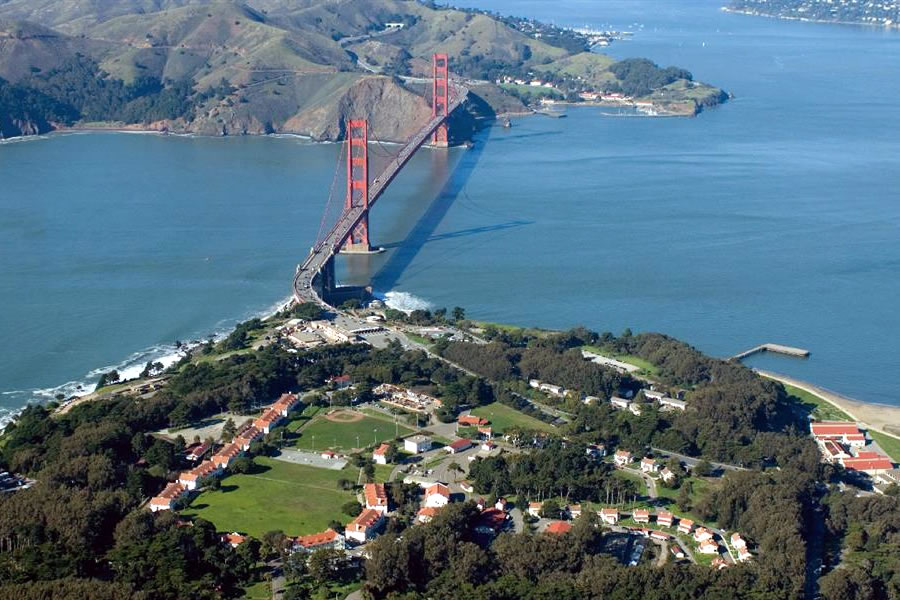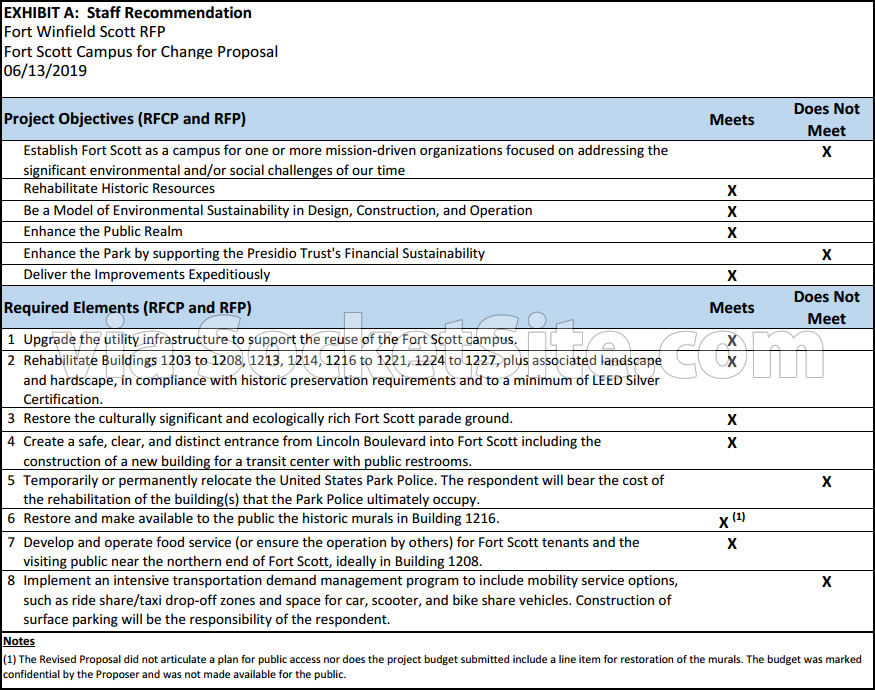With the singular proposal to redevelop the 30-acre Fort Winfield Scott campus in the Presidio having been thoroughly panned by the staff of the Presidio Trust back in April, the proposing team was granted a chance to “update and clarify” its plans.
And with the refined plans in hand and the Presidio Trust Board of Directors meeting at which a go/no go decision is expected to be made scheduled for next week, the Trust’s staff and CEO is recommending that the Board not accept the revised proposal and conclude the Fort Winfield Scott RFP process without awarding the redevelopment rights.
From the CEO’s summary letter to the Board:
“While the Revised Proposal made progress towards the project objectives and required elements, we have determined that the Revised Proposal does not meet all of the project objectives and does not include all of the required elements.
Last fall, we offered Fort Winfield Scott as an opportunity to create a campus dedicated to changing the world. We knew that a person or organization would have to put a significant investment into Fort Scott without expecting a financial return to make this happen. We were willing to give up control of Fort Scott, but only for exactly the right proposal.
While nine entities originally responded, in the end, we did not receive a proposal that met the call to action. We received one proposal from a consortium of primarily for‐profit entities expecting a return on their investment that did not meet all of the project objectives and required elements.
As a result, we recommend that the Presidio Trust not move forward with developing Fort Winfield Scott at this time. Concluding the RFP will free up staff to focus on developing other areas in the Presidio. Our ultimate goal is to generate sufficient revenue to be able to develop Fort Winfield Scott ourselves in a phased approach in the future.”
More specifically:
“Although the Revised Proposal meets several project objectives, it does not meet two [of the required six]:
(1) Establish Fort Winfield Scott as a mission‐driven campus for the duration of the lease; and
(2) Enhance the Park by supporting the Presidio Trust’s financial sustainabilityThe RFP asked the respondents to ensure that the campus remain mission-driven for the duration of the lease. Staff found that the original proposal did not meet this objective.
The Revised Proposal might initially appear to meet this objective; the Proposer states that it will form a new nonprofit entity to lease the buildings from the Trust. However, the new nonprofit entity does not appear to have assets or serve any real purpose. The vast majority of space (approximately 86%) will be subleased to and controlled by two for‐profit entities – The We Company and OpenAI. The World Economic Forum would remain in their two existing buildings (1201 and 1202) while EPIC would lease a fraction of the space (approximately 3%) from The We Company.
Moreover, the revised proposal takes on even more debt via loans from commercial banks on market terms. Should there be a downturn in the market, there’s a very significant risk of default on the loans. A default on the loans would result in Fort Scott being controlled by banks. As such, the proposed financing and business terms do not allow the Proposer to make a solid, enforceable commitment to ensuring that Fort Winfield Scott will remain a campus of mission‐driven organizations for the duration of the lease.
In short, despite the addition of the new nonprofit entity, the underlying structure remains unchanged from the initial proposal: The Revised Proposal still is built on delivering a financial return to its investors. And it continues to lease the vast majority of Fort Scott to for-profit companies. This was not what the Trust had in mind when we issued the RFP. Worse yet…the Revised Proposal would require the Trust to contribute to the costs of the development, something we explicitly said from the very beginning that we would not do.”
And the staff’s scorecard for the revised proposal overall:
We’ll keep you posted and plugged-in.


great news for now. the proposal had way too many new car trips coming into the presidio. Any new proposal would need 80% less car traffic than their proposal offered.
The Presidio is a national park and traffic is already pretty bad a lot of the time. I’m glad to see the powers that be not siding with this.
No, it’s not a national park – it is part of the GGNRA, but it was never intended to be an undeveloped “national park”. From the get-go, after the decommissioning of the base, the Presidio has been a unique public/private mix, with a mandate to be self-sustaining in an urban environment. If the Presidio Trust hadn’t been created, the next most likely alternative would’ve been to give the land to the City, and it all would have been privately developed save a few green spaces.
its not undeveloped, but it also doesnt make sense to overwhelm the most serene park in the city with massive new influx of traffic. some is OK, but 5000 new car trips per day? NO
OK, technically it’s not a national park – but for those of us who use it as a park, that’s what it is – a park. AFAIK, The Presidio has and the Trust has done a tremendous job at striking a balance between public and private enterprises to strike that balance and remain financially self-sufficient.
In any event, my point about traffic still stands. I’m glad they said “no” to the Fisher gallery, as well as Lucas’ desire to build a museum down on Crissy Field.
It’s not a national park? That might be news to the National Park Service.
As noted it’s technically not a “National Park”, but rather a “National Recreation Area”…this is a semantics issue w/ how Public Lands are categorized, not who administers them.
It seems then, what the Board really want is a publicly funded redevelopment. There is nothing wrong with that, but the focus and all this time spent should have been ok pursuing it. Why waste the time of the Presidio Trust staff, the Board, and private developers requesting a proposal the Board knew, or should have known, the private market would not be able to deliver? I am fine with the end result, I could just do without the political theater and waste of resources.
The Presidio has a habit of doing this time and time again — accordingly, I don’t know why anybody should bother responding to their RFPs as it more often than not ends up being an enormous waste of time.
Let the Presidio figure out how to do it on their own — and good luck.
(Meanwhile Fort Scott can continue to decay — and if the Board waits long enough, there won’t be anything left to “restore”.)
“We knew that a person or organization would have to put a significant investment into Fort Scott without expecting a financial return to make this happen.”
Who in their right minds would dump a pile of cash into developing Fort Scott without an expectation that they would make their money back, much less make a profit. Good luck with that, Presidio Trust. You are going to need it–in spades.
What’s the alternative – leave it sitting empty and unused?
I think the Presidio Trust governance of property needs to be re-examined – another case in point are all the old maintenance sheds near Sports Basement – those could be excellent artist studios and maker spaces (which are desperately needed in the city, and would draw a lot of pedestrians to that part of the Presidio) – but decades after the handoff they still sit empty and unused.
And what’s going on with the Main Post / tunnel landscaping project? I haven’t seen any work done on that for months.
whats wrong with developing it AND limiting the number of cars (include rideshare) that comes in to it per day? leaving it unused is better than 5000 new car trips per day here.
Certainly, but how? Maybe if some US cities move forward with congestion pricing, the technology could be used in the Presidio as well. Otherwise, it’s hard to imagine how you practically limit the number of cars, aside from charging for parking, which doesn’t help at all with rideshare traffic.
there are only a few entrances. it would be easy to do a toll to enter the presidio. or a combination of a) limiting parking b) charging rideshare cars a fee for entering c) or requiring a yearly Presidio pass to drive in the presidio (could buy day pass for tourists)
definitely more shuttles, and some incentives for using transit. or re
It is fine for Fort Scott to not move forward. I wouldn’t be so presumptuous to say that this piece of real estate is worthy to change the world.
Pretty much my thoughts (to be fair a fuller explanation might be “tenanted by organizations dedicated to changing the world”, but still…). Their hope that “a person or organization would …put a significant investment into Fort Scott without expecting a financial return”: definitely doesn’t sound like the world we’re in now, so maybe they’ve confused the ends with the means?
I’m going to say Bravo on this one. The Trust was very clear on what they wanted. The applicants gambled that they would take as much as the applicants could give and still make a profit. They gambled incorrectly.
The Presidio Trust does in fact want a deep pocketed developer (or developers) who is driven primarily by mission and not by profit. No, this isn’t the world we currently live in (for the most part), but the Trust has limited carrying costs, is doing well on the rest of its real estate, and always has the option of developing this, gradually, themselves. So….good for sticking with their convictions. (And, WeWork was never going to truly restrict tenants to mission driven folks, that was a set up for failure).
I say “bravo” too, but mostly because the proposal failed objective five (“enhance…financial…sustainability”) Enforcing that – and other tangible metrics like public access, maintenance, and preservation – are certainly things a Trustee should do. But their responsibility stops at the property line: setting themselves up as arbiters of what are the “significant environmental and/or social challenges of our time”, in addition to being incredibly self-important, is also likely to be counterproductive; even if they could do that objectively, letting the property sit idle for years seems like a clear example of letting the ‘perfect be the enemy of the good’…just what a trustee SHOULDN’T do.
I too say Bravo, because ‘king WeWork won’t be rewarded for cutting the other interested parties out of the bidding process. This kinda thing is becoming their modus operandi. From How did WeWork…turn office space with “community” into a $47 billion company?:
Emphasis mine. I realize that won’t gain a sympathetic ear from [all] the commenters on socketsite, but I’m glad Karma paid WeWork a visit.
I would not call this “karma.” The Trust put out an RFP, which they admitted they had doubts any applicant could satisfy. WeWork proposal ended up being the only proposal to even move forward for consideration. In the end, the Trust decided not to select their proposal, or any proposal, which is the rather unsurprising result you get when you set criteria you doubt any applicant will meet. That is not “karma,” it is just a stringent public bidding process. I am sure the multi-billion WeWork is not losing any sleep over this failed bid. My ear is not necessarily “unsympathetic,” I simply think you are reading something into this situation that does not exist.
UPDATE: Plan for Presidio Redevelopment Rejected